His left foot was feted and feared across the land. When going for goal he had a particular penchant for a left-footed drop kick. The power he generated was savage. On one occasion, Colm McCrory from Glen had the great misfortune to be in goals when Roddy Gribbin came through and unleashed an absolute pile driver. A pure rocket. Colm caught the ball on his chest. The thud created an echo which reverberated around the Glenshane Pass. The impact of the shot slightly winded Colm and after he cleared his lines, he took a knee. As Colm struggled to get his breath, one of his team mates asked him if he was all right. “I’m okay,” replied Colm, “but that shot would have killed any normal man.”
Following the death of Fr Larry Higgins in Tampa, Florida, USA, Roddy Gribbin is now the last remaining member of the 1947 Derry senior football team, the first from the Oakleaf County to win a national title. Just days before his 92th birthday, the Newbridge and Derry legend spoke to Seamus McRory exclusively for DerryGAA.ie.
*****
Our county’s greatest contribution to the world of English Literature – poet Seamus Heaney – always emphasised the tremendous impact geographical divisions or boundaries of any kind have made on the daily social interaction of our lives.
In his South Derry Homeplace, he often referred to the Sluggan Drain – a long stream which meandered between the basin of the Moyola River in the west and Lough Beg in the east. It separates the parishes of Bellaghy and Newbridge, the dioceses of Derry and Armagh and most appropriately, in his case, the townlands of Tamniarn and Anahorish.
The latter two physically separated the homesteads of the Heaneys and the famed Derry GAA footballing family – the Gribbins. A drain may have divided these childhood neighbours, but emotionally, despite the constraints of parish and football rivalry, both families were inseparable friends “as they were always going backwards and forwards between the two”.
When a coterie of famous Derry people appeared on the “Up for the Match” TV programme before the 1993 All Ireland football final, the six Gribbin brothers and Seamus Heaney were invited guests. Roddy Gribbin will never forget what Seamus Heaney publicly said that night, that “The Gribbins were great neighbours before they were great footballers.”
Modesty forbade him to elaborate, but this was a reference to how the Gribbins were always so supportive to Seamus and his family but especially during the wake of his four year old brother Christopher. He had been killed in an accident and was the subject of Seamus’ most famous poem “Mid – Term Break.”
“There was no gaudy scars, the bumper knocked him clear.
A four foot box, a foot for every year.”
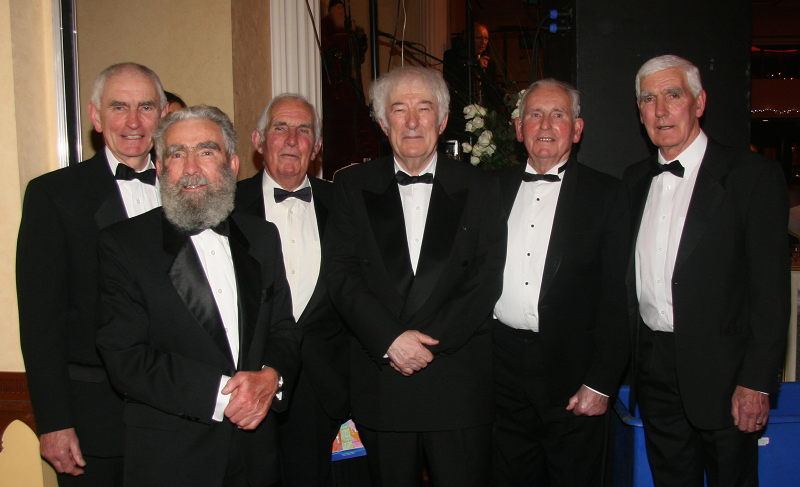
*****
20-year-old Roddy Gribbin was ecstatic when he was first selected to play a championship match for Derry. At the age of sixteen he had started playing for his club Newbridge.
One Sunday, in the Spring of 1945, he turned in an impeccable display of brilliant forward play in a McGlinchey Cup final against Glen at Ballinascreen. Referee Harry Owens immediately alerted the County selectors to pencil in his name to join the Derry Junior County side the following Sunday.
So capable was that team that they eventually went on to claim Derry’s first Provincial title, in any grade, when they defeated Armagh by eight points in that year’s Ulster final. However, owing to Second World War travel restrictions, there was no All-Ireland series then. This disappointed Roddy as he felt they had a team good enough to go on to win a Junior All-Ireland. He explains:
“Nevertheless, as we had comprehensively beaten Antrim, Donegal and Tyrone on the way to that Provincial title we were encouraged to re-enter the Ulster Senior championship after a lapse of many years. So, four weeks later, we were drawn to play Donegal in Letterkenny. I got on my bicycle in Newbridge on the Saturday evening before the game, at five o’clock, to cycle the five mile journey to Magherafelt where I got the service bus to Derry City. All of the other players had gathered there from all over the county. Then we got a train to Letterkenny where we stayed overnight. When we heard there was a big Céili in the town we went to it and danced the night away. It was not exactly the best preparation for Derry’s debut in an Ulster Championship fixture!
“Still, we played well though in the end we were beaten by seven points. After the game we took the return train to Derry, then another bus back to Magherafelt. When I took my bicycle clips off at home it was half nine. Though naturally disappointed I was optimistic that we had the makings of a good team.”
This team was destined to win four more competitions in the ensuing years. Two Lagan Cups (the prize then on offer for winning the Northern section of the National League which was then organised on a regional geographical basis before the four group winners faced each other in the semi-finals) and a McKenna final were won.
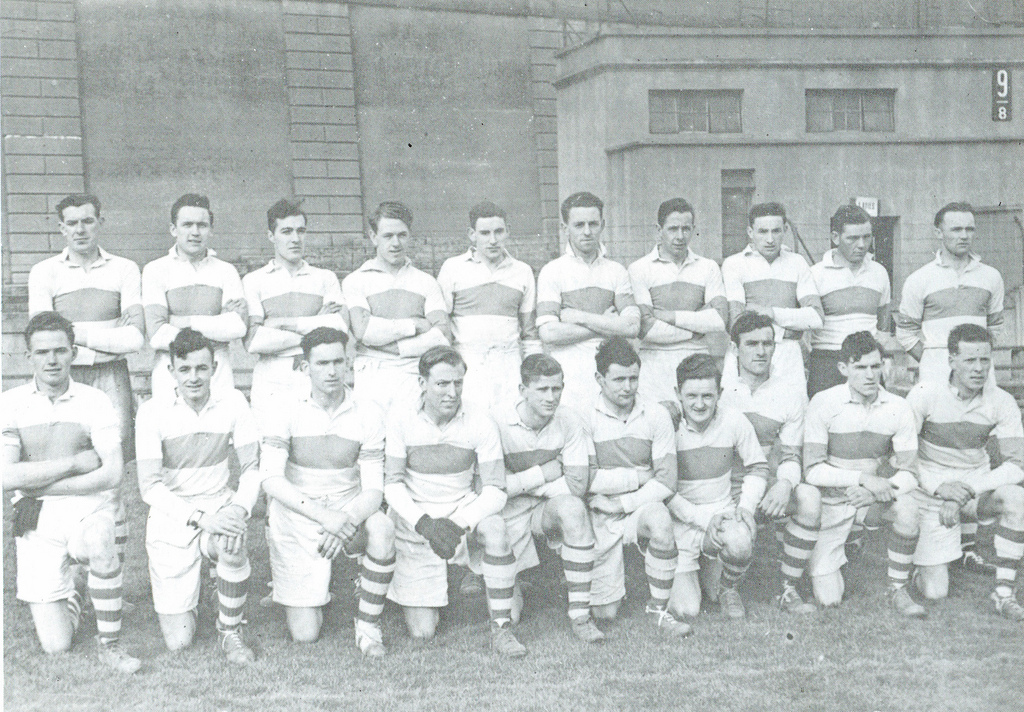
However, 1947 will go down in the annals of Derry GAA folklore as the year they became the first team from the Six Counties to win a National title. The weather was so bad that Derry were the only group winners to complete all their games when they defeated Armagh, Tyrone and Donegal before they dropped their only point to Down with whom they drew.
It was their triumph over the previous September’s All Ireland finalists, Antrim, in the final group game, which made all GAA followers take notice. Derry and Roddy Gribbin had now qualified for the NFL semi-final against Longford. Played in Celtic Park Derry were superb as they overcame the midlanders by nine points. In the final on Easter Monday, in Croke Park, Derry faced a rugged Clare side who put up a stern resistance. But, as the Irish Independent reported, it was the brilliance of the Derry forwards – especially teenage prodigy Larry Higgins who was man of the match according to one journalist- which justifiably won this game by four points for the Ulstermen.
“We had a very good team. Players like Lavey men Jack Convery and Joe Hurley, John Murphy from Newbridge and Sonny McCann from Castledawson were excellent defenders as was Glen’s Charlie Moran (Mickey’s father) in goals. I was at midfield alongside Mickey McNaught from the Sean Dolans club in Derry City. He was really a talented player.
“The half forward line of Captain Pat Keenan, Francie Niblock and Larry Higgins were all from Magherafelt. They were well used to playing together and this kind of cohesion was of immense benefit to us. Unfortunately there was no presentation ceremony and the Cup was sent to Magherafelt on the following Friday. 45 years later it was officially presented to Pat Keenan by GAA President Peter Quinn, in 1992, in a ceremony in Croke Park!”
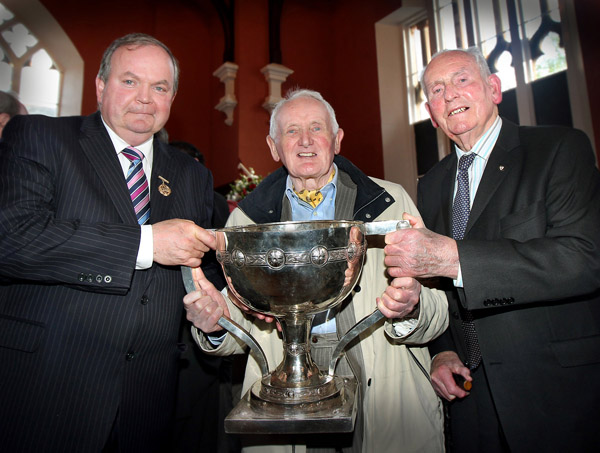
Margaret McLaughlin
When Derry comfortably beat Armagh in the McKenna Cup final in Clones before six thousand spectators, almost seven weeks later, Roddy Gribbin thought Derry football would continue on the crest of a wave. With the exception of two Provincial Junior titles in 1950 and 1953, for the next eight years the only success at Senior level for Roddy and his teammates was a McKenna Cup victory over Armagh in 1954. Roddy was left half forward on that team and his younger brother Mick was a tigerish right half back in the side.
It was the 1955 Ulster SFC which was to become a catalyst for future Derry Senior success. A great first round victory over Tyrone followed by a tremendous winning – performance against Armagh meant that Derry were in their first Senior final since 1921.Though their opponents Cavan won by 0-11 to 0-8 Derry followers were not too dejected.
Roddy Gribbin, who was excellent throughout at full forward, totally dominated legendary Cavan full back Phil “Gunner” Brady, scoring three brilliant points in the process. His brother Mick scored a point and another brother Owen came on a as a substitute.
In addition to their Senior’s improvement that year’s County Junior side won the Ulster Championship and went on to reach the All-Ireland Junior Home final but were beaten by Cork. On that team was Roddy’s eldest brother Willie at full back and three players who would later star on the Senior County team, namely goalkeeper Patsy Gormley, left half back Peter Smith and the versatile Brendan Murray. Incidentally his younger brother Hugh Francis who was destined later to become a stalwart of Derry Senior football was promoted onto the Senior team after impressive performances on the Junior’s Provincial campaign thus rendering himself ineligible for further participation with them in the All-Ireland series.
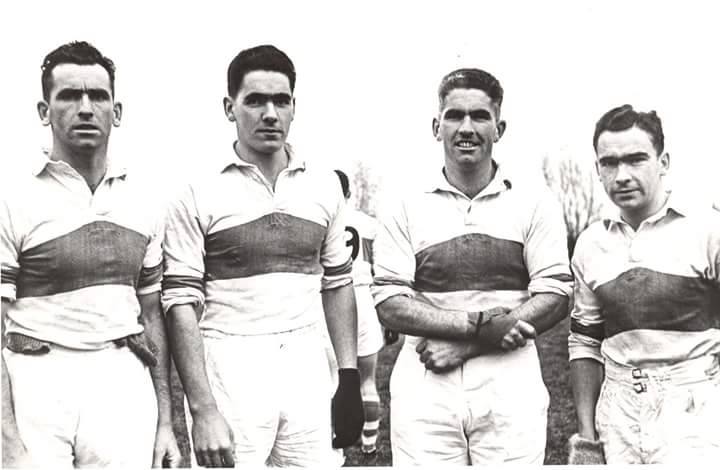
So, in 1955 four Gribbin brothers, Roddy, Owen, Mick and Hugh Francis, had featured on the Derry Senior championship team while a fifth, Willie, played for the Oakleafers in an All-Ireland Junior final.
This fact alone must have created a unique family record for any County team in Ireland.
All these years Roddy’s consistently, outstanding performances for Derry were attracting the attention of GAA aficionados both within and outside the County. Nevertheless it was not until 1956 that the Ulster Railway Cup selectors actually picked him. In the 1956 final he was a star in Ulster’s victory over Munster.
“At last I had achieved two of my personal ambitions, to play with top players from other counties in my own province and against household names outside my own province. As well as that I succeeded in playing in Croke Park,” Roddy told me when I spoke to him a few weeks ago.
Back to reality, a few month later, saw Derry bow out timidly to an excellent Tyrone side who would go on to win back to back Ulster Championships in 1956 and 1957. However, Derry had a very satisfying Provincial campaign in 1957. With legendary Kerry player and mentor Paul Russell now training them Antrim were overwhelmed in the first round and Cavan edged out by a point in a titanic struggle in the Provincial semi-final. In the Ulster final Derry again played superbly but were beaten by a fantastic Tyrone side by two points. The next year – 1958 – was to prove pivotal both for Roddy Gribbin and Derry.
Now in the twilight of his playing career Roddy was persuaded, in early 1958, to take over the training of the County team. The word “manager” had not been invented yet but to all intents and purposes Roddy was just that. I remember well, as a child, going to Ballinascreen in the Spring of that year and seeing Derry put in a tremendous performance to defeat Tyrone by ten points and become one of two teams (Galway was the other) to qualify for the new Wembley Tournament final which was held in the month of May. Though defeated by the Westerners in the inaugural GAA game at the famous soccer stadium, Derry were now nationally considered as very serious contenders for a Provincial title. Roddy Gribbin was ready and willing as a player/trainer to play his part.
“As I had been captain of the Newbridge club side which had won a lot of competitions I sort of evolved into my new role. With intelligent forward-thinking players like Jim McKeever, Sean O’Connell, Phil Stuart, Patsy Breen and all the others to guide me, my task was made a lot easier.”
In the first round of the Ulster Championship against Antrim Derry played poorly before eking out a narrow three – point victory. In the semi-final with Cavan the whole team played impressively, with Jim McKeever in inspiring form at centrefield, as they secured a four-point win.
They were now in their third Ulster final in four years. The Ulster final against newcomers Down was the first Ulster final since 1890 that neither participant had previously won the championship. Again after another four – point winning margin Derry gained that elusive first Ulster title. Since he had taken charge of the team at the beginning of the year Roddy Gribbin was an undefeated mentor. In addition to the training of the team, in his native Newbridge, he and his family provided tea and sandwiches, at their own expense, after each training session. Such gestures were the hallmark of a loyal, dedicated GAA family.
In one of the greatest shocks in the history of the GAA Derry defeated the traditional kingpins of Gaelic football Kerry by a single point in the All-Ireland semi-final in Croke Park. A fantastic goal by Sean O’Connell, three minutes from the end, was the coup de grace in a famous victory.
“We had never thought in our wildest dreams that we would beat Kerry. It was only when our full forward and my brother Owen shouted to Jim McKeever that we were in the All-Ireland final that the enormity of our accomplishment sank in.” the lifelong Pioneer and non-smoker said.
In the final itself Derry played well and with twenty minutes to go the sides were level. However, some uncharacteristic defensive errors and one major officiating mistake allowed Dublin to obtain a six-point victory. Roddy recalls referee Simon Deignan’s performance.
“Owen was continually being fouled and several close in frees should have been awarded to us. Whereas those non decisions were bad enough his refusal to award a definite penalty when a Dublin defender picked the ball clean off the ground in the parallelogram was completely inexplicable.”

That was the pinnacle of that wonderful Derry team’s achievements. County chairman John McLaughlin addressed the huge crowd which assembled in Maghera on the following Monday night to welcome home their defeated heroes. To deafening applause he reiterated how the undoubted, positive impact of that year’s series of brilliant displays had awakened the Gaels of Ireland to a new footballing force.
“In all their victories Derry performed brilliantly and always exhibited sportsmanship of the highest order. Derry not only stirred the hearts of Derry but also the hearts of Ireland.”
For two further years that Derry team and Roddy Gribbin soldiered on. Though they reached two league finals in 1959 and 1961 the team had effectively run its course and Roddy retired from the County scene in 1960 and club activity in 1962.
The playing candle of a truly illustrious servant of Derry and Newbridge football was now extinguished. To add to the already mentioned County Honours, Roddy won four Senior County club championships, 10 successive McGlinchey Cups and many Senior League titles with Newbridge. Another significant achievement was the unparalleled record of Newbridge remaining unbeaten for two years in the late forties in the then prestigious 7-a- side club competitions.
“These ran from May to September each year and they usually took place on Sunday evenings after our league matches,” reveals Roddy. “They were run off in conjunction with local Sports days and Carnivals. Most Sundays during that period we were playing in a tournament in Derry, Tyrone or Antrim. The prizes were officially items like gold watches, suit lengths or vouchers offering free weekends in Dublin for each player. (This tactic was to ensure that no club or player could be suspended from transgressing the GAA’s rule on the amateur ethos which forbid any monetary reward for players – the penalty for which was an immediate and lengthy suspension from the Association).
“Unofficially, very often cash was given in lieu of the publicised prizes. This could become a lucrative enterprise for the more successful sides. It is often said that one student who took part in these tournaments had earned enough money to pay for all his expenses and fees for a whole year! In case a 68 year old suspension is activated retrospectively I will not reveal his name! Our team during those tournaments was normally, John and Joe Murphy, Joe Donnelly (father of former County PRO Gerry), Hugh McGrogan, Jim McKeever, Owen and myself.”
*****
Roddy Gribbin was born in 1924, the son of Hugh and Anne. He had five brothers Willie (R.I.P), Owen, Mick, Hugh Francis and the youngest Henry who also shared with his five brothers many of their achievements on the field of play in the green and white club jersey of Newbridge. He also had two sisters, Kathleen and Mary, both of whom died at a young age.
Willie, Roddy and Owen carried on a mixed farming enterprise as well as the pig producing, buying and selling traditions of their father. The other three brothers were educated at St Malachy’s College in Belfast. Mick qualified as a teacher, Henry as a Veterinary surgeon and High Francis became a farm Manager in County Meath.
Roddy and his wife Anna have a family of seven: Marie, Ann, Paul, Roisin, Catherine, Roger and Una all of whom have a deep interest in the GAA.
Monsignor Larry Higgins, the second last surviving member of that 1947 winning team, died in Tampa Florida where he had been stationed for over 60 years on August 24th last. As a priest he had been an iconic figure as a spiritual mentor to Catholics and non-Catholics alike. He was also a very capable administrator and had served as a chaplain to the Tampa Bay Buccaneers.
“From our regular chats over the years I always knew he was a very talented individual in so many ways. Owen, Mick and myself last met him about three years ago when we had a meal in The Elk restaurant. For over three hours we reminisced about all the games we played and the people we met in the playing fields of Ulster and Ireland. He was only 18 when he played in the league final. He was a very skilful player. Solo running was his speciality. Now I have the honour of being the last survivor of that side which gave so much pleasure to so many people.”
When Roddy Gribbin and his brothers went up after that RTE programme 23 years ago to thank Seamus Heaney for his kind comments, Seamus sensing the brothers’ embarrassment about what he had said, quickly diffused their discomfort.
“When you come to shows like this you have to have your good lies well prepared!” he smiled knowingly.
“What I liked most about Seamus Heaney was his ability to be ordinary. He could speak with all the top intellectuals in the world in a language that only they could understand. Yet when he was at home in South Derry he was always a Derry man talking to Derry men and women about the things that they understood and knew best.”
“We marked the pitch: four jackets for four goalposts
…….And then we picked the teams
And crossed the line our called names drew between us.”
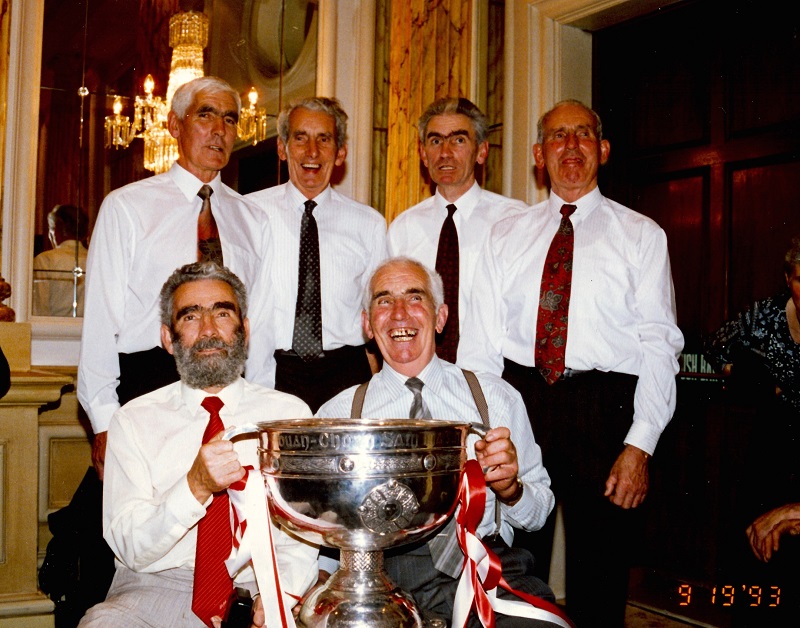
The traditional values of loyalty to faith and fatherland, family, community, parish, county and province are central to the mind-set of the Gribbin family. As well as a lifetime of service to the GAA Roddy and Owen were also prominent in the Credit Union movement and Roddy is a former SDLP councillor and was a party activist for many years. In the final analysis he was and is a man of the people.
“Ask not what you can do for me but what I can do for you,” would be his constant and most abiding mantra. Since he first donned a club jersey in 1941 Roddy, who will be 92 on October 26th, has been synonymous with Newbridge and Derry GAA over that 75 year period. Roddy, may you live to see at least five score years and beyond. No one deserves it better.
No one deserves it more.

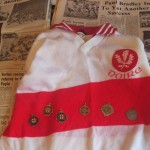
Really great article and so. I just history. I am Monsignor Higgins nephew and i know he always spoke so highly of the derry 1947 team and especially his friendship with the gribben brothers.